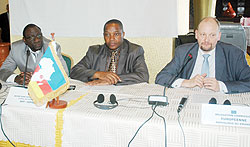KIGALI - Countries under the Economic Community of the Great Lakes Countries (CEPGL) have agreed with development partners to embark on the implementation phase of the Rusizi III Hydropower plant which will add 145MW on the power grid network of the three member states.


KIGALI - Countries under the Economic Community of the Great Lakes Countries (CEPGL) have agreed with development partners to embark on the implementation phase of the Rusizi III Hydropower plant which will add 145MW on the power grid network of the three member states.
CEPGL is comprised of Rwanda, DRC and Burundi.
Following the completion of feasibility studies on the project expected to cost some $500m, a two-day meeting organised under CEPGL’s energy utility; Energy for Great Lakes Countries (EGL), brought together partner countries and the major project financier, the European Union, to discuss the way forward on implementation.
Project partners from the public and the private sector including representatives of member states, the Permanent Secretary of CEPGL, sub-regional organisations of the energy sector, national power utilities and financiers assessed the findings of the studies conducted by Fitchner and SOFRECO-MERCADOS RSW Consortium.
"All studies have been completed and if ground work starts in 2011, the plant will be ready in 5 years, by 2016,” said the EU Head of Delegation in Rwanda, Michel Arrion.
"Countries will take an equal share of the power output, that is a third of the electricity produced and once complete, the dam will be managed by a private company.”
The EU is the major donor of the project---the 3rd on Rusizi River implemented by the three countries which will also contribute towards the project.
The private sector will also contribute under a Public-Private Partnership (PPP) arrangement.
During the meeting, emphasis was put on the necessity of including, in addition to the investments related to Rusizi III Power Plant, the lines and stations for the evacuation of the energy produced to the direction of electric networks of the three countries.
"The EU is committed to funding the project from start---that is the feasibility studies through implementation, putting in place the required infrastructure as well as high voltage wires to carry electricity to each country’s central power point,”
"Countries will take care of the networking costs and any other negotiations that may follow after,” Arrion explained.
During the meeting, it was agreed that apart from pooling resources to develop the plant, Rwanda and DRC continue with the negotiations to put in place a basin treaty to protect the Kivu waters from any kind of abuse.
Ends


